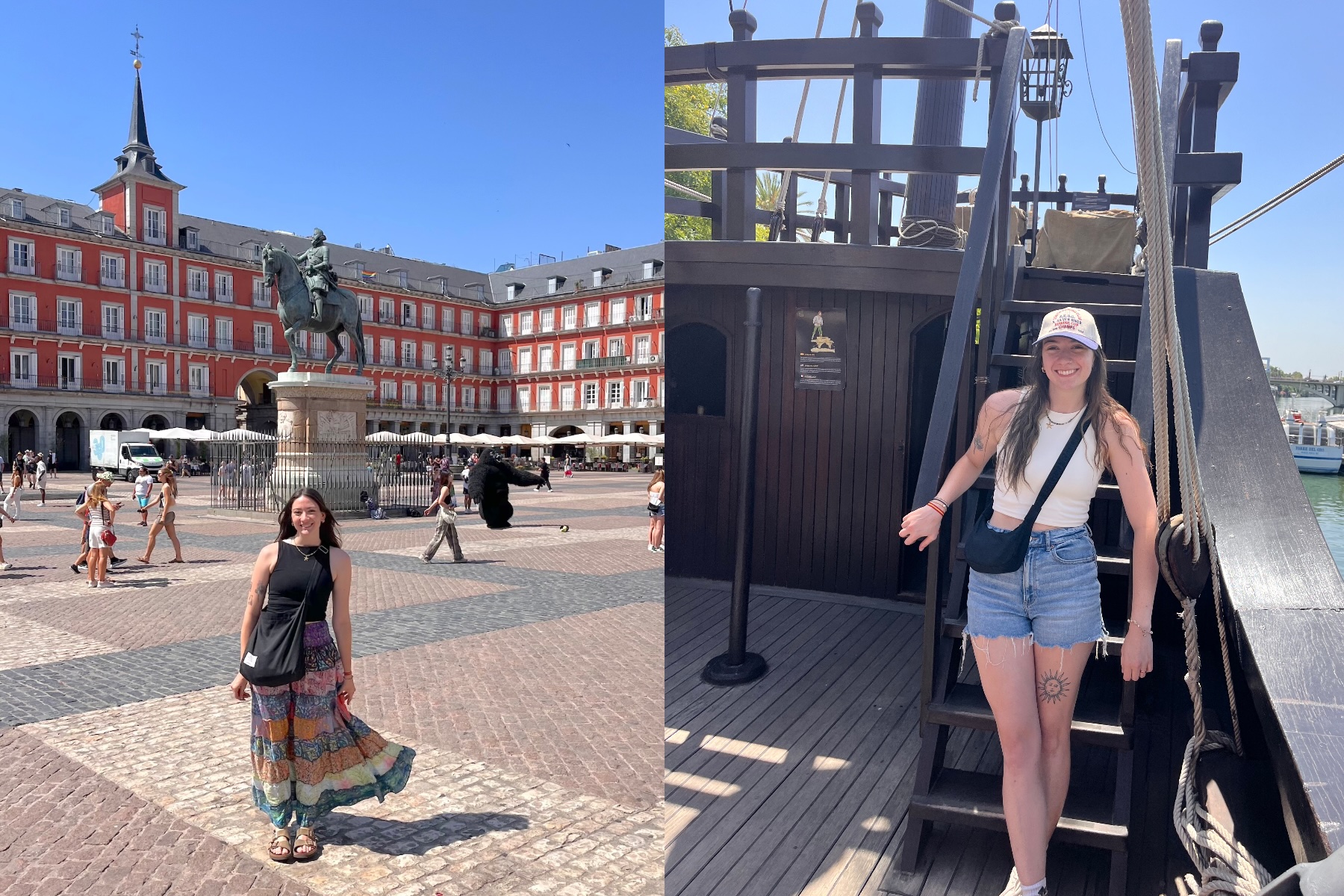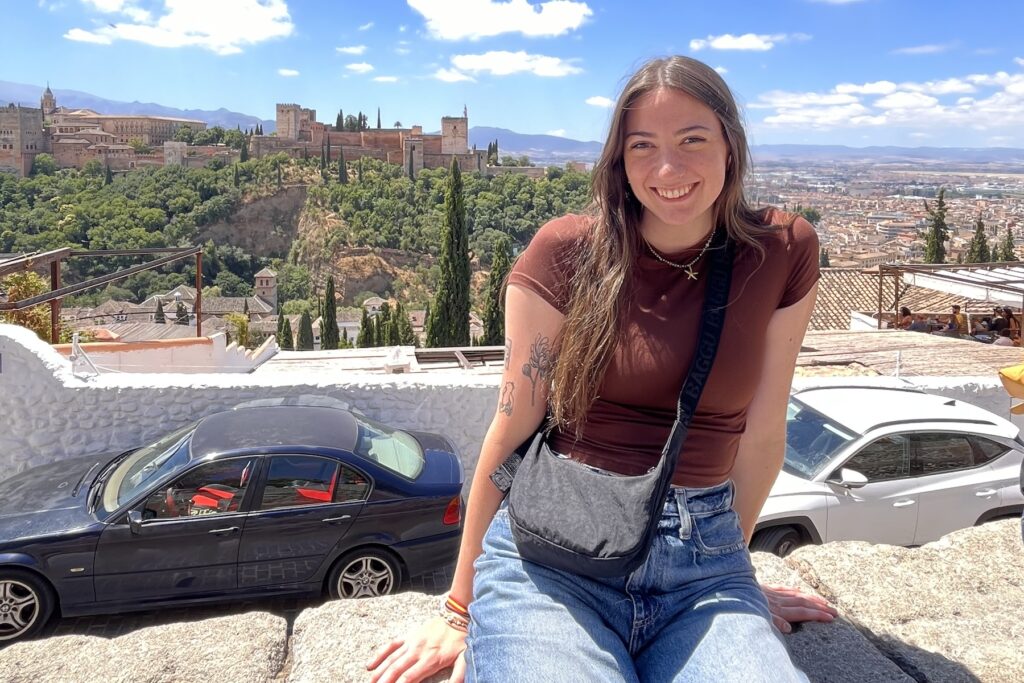A rising senior from Snellville, Georgia, Morgan is studying English Literature with minors in Spanish and Communications. Her study abroad experience was made possible by the Gilman Scholarship.
“The significance of the Gilman scholarship for me cannot be understated. Not only is it a privilege, but also an enjoyable challenge to be more intentional and pensive before, during and after studying abroad,” Morgan said. “The essays required for the application, the pre-departure steps after receiving it and the follow up service project create a thorough line of reflection. Moreover, the finances of the scholarship, along with other financial aid, are what enabled me to study abroad. In other words, without the money provided by the scholarship, I could not afford the trip. Therefore, I am very grateful for the incredible opportunity it bestowed me to truly experience another culture and language firsthand.”
Morgan appreciates the opportunity to immerse herself in Spanish culture.
“I always loved studying Spanish in middle and high school but I didn’t pursue it very far. But taking Spanish in college, it just reignited that and knowing that I would be in a different country and a different culture and surrounded by this language. I thought that would be really instrumental to my practice learning and understanding of the language,” she said.
Morgan’s trip to Spain represented some firsts for Morgan—her first time flying and first trip out of the country. She enjoyed experiencing the history and culture of Seville and surrounding cities, including a day at Cadiz on the Mediterranean coast. She also traveled to neighboring Portugal.
“We got to see the cathedrals and the center of the city and got to spend a couple of hours on the beach. We also went to a palace, the Casa de Pilatos. That was probably one of my favorite days,” she said.
Morgan enjoyed being able to walk to her classes at Trinity Christian College from the home of her host and adds that public transportation has been readily available as well. Her classes are The Golden Age of Spain and Modern Spanish Culture.
“The classes are a little bit longer. We have them from 9:30 to about 1 p.m. with a 30-minute break at 11, and of course they are all conducted in Spanish,” she said. “It’s been cool to not only learn the history but to learn it in a different language and then we also have been visiting the sites we talk about. It’s been really cool to actually be able to go out and see these centuries-old places with this history we just learned in the classroom.”
Morgan has learned to appreciate the different rhythm of daily life in Spain.
“They have three blocks of the day based on meal times. Eight a.m. to 1 p.m. is technically morning for them. And then from 2 to 5 is the siesta time. That’s when you eat and then you maybe take a nap and rest your eyes a little bit. That’s when most stores are closed. I do some homework if I can. You have the entire afternoon, and then from 6 until 9 people are out. It’s like a whole second half of the day. We eat dinner at about 9:30 p.m., which is very different from what I’m used to,” she said. “The days feel longer and it feels like we take more advantage of them. I think that’s also why it feels like I’ve been here for a long time. That was one thing I definitely had to adjust to, but it wasn’t a bad thing at all.”
Morgan has also enjoyed spending time with her host and getting to know classmates from all over.
“I really love my host mom. I live with her and her older sister. I’ve met some of her siblings and her children. And then also it’s been cool meeting the other students—some from California, Washington state, Illinois—not only am I meeting people from Spain who grew up in Spain but also people who grew up in different areas of the United States,” she said. “I’m doing an Instagram takeover. I get to be logged into the Semester in Spain program’s Instagram and record my daily experiences for prospective students to see what it’s like.”
Semester in Spain takes place at Trinity Christian College: Seville. Morgan is taking Modern Spanish Culture and Language, and also Spanish Literature.
“You learn so much and so much more naturally and quickly by being in that immersive setting of having to speak to your host mom in Spanish, watching television with them, speaking during lunch, listening to your professors in Spanish and answering questions in Spanish and answering questions in Spanish. Ordering coffee and all of these different things you would normally do and you’re doing it in your second language—it’s reinforcing that,” she said. “Being able to live in the place you’re studying, and especially with a host family, is such a unique cultural experience that you can’t recreate.”

The Gilman Scholarship
A congressionally funded program of the Bureau of Educational and Cultural Affairs at the U.S. Department of State, the Gilman Scholarship was named after the late congressman Benjamin A. Gilman from New York. The International Academic Opportunity Act of 2000 established the program. Details about the Gilman Scholarship can be found online at www.gilmanscholarship.org.
The AU Center for Global Engagement
The Anderson University Center for Global Engagement directs short-term programs, mission trips, faculty-led experiential learning programs and semester-long programs. Anderson University has cooperative agreements so students can take part in semester-long programs in such countries as: Argentina, Australia, Canada, Chile, Costa Rica, Croatia, Czech Republic, England, France, Germany, Greece, Ireland, Italy, Lithuania, New Zealand, Scotland, South Africa, South Korea, Spain, the Netherlands and Uganda.
For more information, contact the Center for Global Engagement at studyabroad@andersonuniversity.edu or (864) 231-2141.

